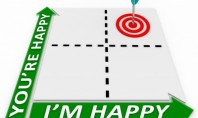Personal data, privacy and the internet – A big picture perspective

Social psychologists have a neat equation that summarises the drivers that shape our behaviour:
B = P x S where B=behaviour, P=person and S=situation
What’s implied by this is that what we do and how we do it is partly driven by the kind of person we are: extroverted or introverted, generous or mean, nervous or confident and so on. That’s the individual psychology bit. But another large part is driven by the situations we find ourselves in: an interview, at a party, at a dinner party, at a funeral. Whatever kind of person we are, our behaviour in these different situations will be very different (or it should be!). That’s the “social” bit of social psychology.
One of the implications of this equation is that it directs our attention to the importance of knowing (and adhering to) the rules of the situations that we find ourselves in. Parents spend a good deal of their time telling their children what situation they are going to (“we’re going to Granny’s Birthday Party”), and what they can and cannot, should and shouldn’t do in that situation, and indeed, actually teaching them how to carry out those required behaviours. This situational coaching ranges from teaching children to wish their Granny a “Happy Birthday” when they arrive, to reminding them of the table manners Granny looks for when they are part of the celebratory meal, to rehearsing them to sing “Happy Birthday” along with all her other grandchildren as the highlight of the party.
So situations are important, and knowing the rules that tell us what to do and what not to do is an important part of what it means to be a properly socialised member of a community. But what happens when we create new situations? Throughout history people have created new situations. A primary way of doing this was simply to create new sets of rules about what was done and how it was to be done: the rules are the situation. For instance, the Christian Church created many new situations such as christenings, confirmations, weddings and funerals. Another way that new situations were created was by creating new kinds of spaces, allowing or requiring new kinds of behaviour. The original form of the house, with one large room shared by everybody and used for everything gradually became subdivided, with different rooms for different purposes (such as “withdrawing rooms” and private bedrooms) and new rules were developed that are now a taken-for-granted part and parcel of those situations which say who can and cannot go into those rooms and what they can and cannot do when they are there. A third source of new situations is the development of new technologies, particularly new communication technologies. The telephone created real problems for early adopters in terms of the social rules governing its use, with heated arguments about, for instance, whether the owners of the house should answer the phone, or whether that was the job of the butler or house maid. The invention of the mobile phone has given us a new set of rules to develop, as recent stories about the rights and wrongs of talking on mobiles while being served in shops is OK or not.
The point here is that situations aren’t just about the physical arena and props that mark the situation, they are also and perhaps more importantly about the rules that create and govern that situation. And those rules have to be invented, and disputed, and developed, and finally widely accepted… they don’t appear in an instant, perfect and fully-formed.
The internet is often referred to as a “virtual world”. Actually, it’s no more virtual than many other situations that we negotiate every day. It too has physical elements (the laptop or smartphone you use to access it, plus all the other hardware that makes it run) and, slightly less tangible (but still as tangible as book or newspaper, guidebook or DIY manual), the software that organises how that hardware works. What is special about the internet is the number of different kinds of situations it has allowed people to create in an incredibly short time: from email to blogs to webchat to Facebook to Twitter to shooter videogames to webinars to…. Each and every one of these is a new situation, with people having to work out not only what it is possible to do in each of these new environments, but also what should be done, and should not be done in each of them. So what we are now seeing is simultaneously a massive colonisation of these new situations, and a frenetic working out of the rules that are needed to govern each of these new situations.
Perhaps the best analogy we have for what is going on is the opening up and settling of the America by European immigrants. As settlers reached America and then later flooded west into what was largely (but not entirely) empty country there was no law in place, and for quite a long time the country might have appeared to be lawless. But people brought some law with them, not all of it law which they liked, and they changed it and developed further law and understandings about how they should relate to one another that took into account the new circumstances they were encountering and creating. That body of law took time to create, and is still being created. In the same way, the Internet is a new country (indeed, a whole set of new countries) and the settlers are still working out what laws and understandings are best suited for living in each of those new countries.
From this perspective, the difficulties and disputes that pervade the Internet today, from governments ubiquitous spying on their own and everybody else’s innocent citizens, through companies taking and mis-using personal data without informed consent, through to trolls on Facebook, and so on, all can be understood as part of the colonisation and socialisation of new situations. We shouldn’t be surprised that there are disagreements and arguments about what the best set of rules are, we should expect them to change and develop as we learn what the costs and benefits are, and we should expect it to take some time. But we should also be prepared to take an active interest in, and be part of the process of law-making so that we end up with situations that we want to be part of.






















